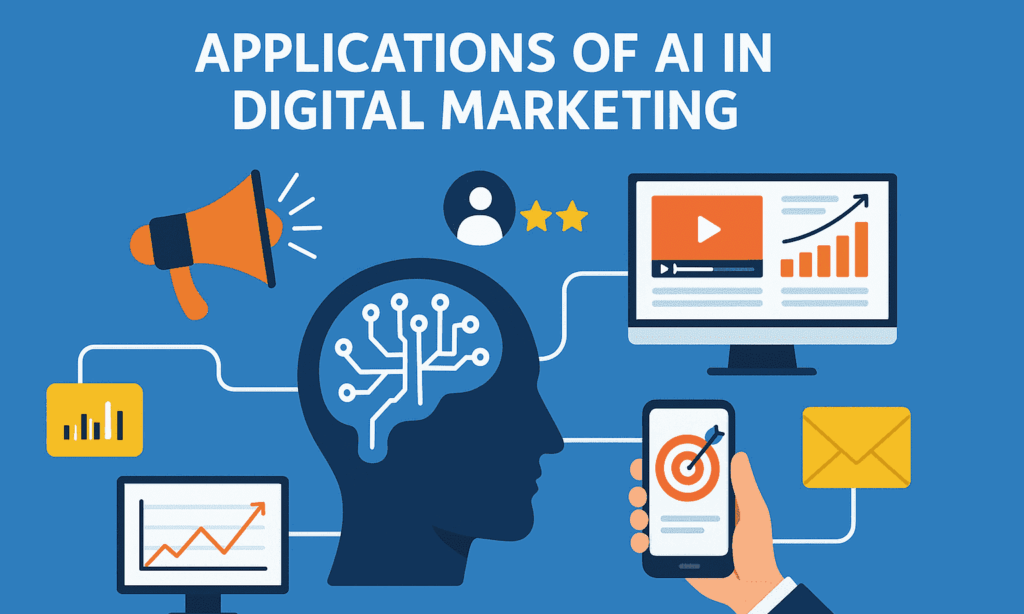Introduction
Marketing has become a dynamic and data-driven practice in today’s fast-paced digital economy, with technology at its center. Among the most revolutionary innovations transforming this space is artificial intelligence (AI). No longer a science fiction idea, AI has become an essential part of contemporary digital marketing strategies, revolutionizing the way businesses engage with consumers, tailor experiences, and fuel growth. With the use of AI-based technology and algorithms, marketers are better able to see deeper into consumer behavior, eliminate complicated processes, and make smarter, real-time choices that boost performance and ROI. In the Digital marketing services in uk are increasingly leveraging AI to drive more effective campaigns and connect with audiences on a deeper level.
This blog delves into the powerful synergy between AI and digital marketing, examining how AI is revolutionizing customer engagement, enhancing campaign efficiency, and enabling brands to stay ahead in an increasingly competitive environment. From benefits and practical applications to ethical considerations and future trends, we’ll uncover how embracing AI can truly transform your business landscape.

Also Read – The Evolving Role of a Digital Marketing Agency in the UK: Future Skills and Strategies
Understanding AI in Digital Marketing
In digital marketing, AI is a game-changer. It allows marketers to analyze large datasets, spot patterns, and predict user behavior with remarkable accuracy. It empowers businesses to deliver hyper-personalized experiences, automate routine tasks, and optimize campaigns in real time.
The Role of AI in Digital Marketing
- Data Analysis and Insights: AI can process vast amounts of data quickly and identify patterns, enabling marketers to make informed decisions.
- Customer Segmentation: AI helps marketers segment their audience more precisely based on behavior, interests, and demographics.
- Chatbots and Customer Support: AI-powered chatbots offer 24/7 support and enhance customer satisfaction.
- Content Creation and Curation: AI tools can generate articles, headlines, and even video content based on user preferences.
- Predictive Analysis: AI can forecast trends and customer behavior, helping businesses stay proactive.
- Ad Targeting and Optimization: AI ensures that ads reach the right audience at the right time, maximizing ROI.
Benefits of AI in Digital Marketing
- Improved Efficiency: Automation driven by AI decreases the amount of time and resources wasted on dull, repetitive tasks leaving marketers more time for strategy and creativity.
- Enhanced User Experience: Real-time personalization, predictive suggestions, and smart engagement tools allow for smooth, engaging customer experiences.
- Higher ROI:By targeting the correct audience with the correct message at the correct time, AI-based campaigns eliminate wastage of ad spend and increase conversion rates.
- Real-Time Decision Making:AI enables marketers to rapidly adjust strategies from live data, making adjustments to campaigns in real-time to maximize performance.
- Deeper Customer Insights: Advanced analytics give a more detailed view of customer behaviour and preferences, driving wiser product and marketing decisions.
- Cost Optimization: By automating and optimizing, AI reduces human error and minimizes the scale of operational teams ultimately saving on costs.
Applications of AI in Digital Marketing in Real Life
Let’s look at some real-life examples where AI is transforming marketing:
- Chatbots: Sephora and H&M utilize chatbots for customer service and product suggestions.
- Email Marketing: Mailchimp and HubSpot utilize AI to personalize subject lines, send times, and content.
- Search Engine Optimization (SEO): AI software like Clearscope and Surfer SEO optimize content for improved ranking.
- Programmatic Advertising: Ad platforms like Google Ads leverage AI to automate ad buying and targeting.
- Content Generation: Software like Jasper and Copy.ai help marketers generate effective content.
- Voice Search Optimization: With the growth of smart assistants, AI optimizes content for voice search queries.
- Social Media Monitoring: AI software monitor sentiments, trends, and recommend content strategies.

AI Tools of Digital Marketing
There exists an extensive range of AI tools to revolutionize how marketers work:
- Customer Relationship Management (CRM): Tools like Salesforce Einstein use AI to predict customer behavior, recommend next steps, and enhance lead scoring. This helps teams close deals faster and more accurately.
- Analytics Platforms: Google Analytics and Adobe Analytics utilize AI to provide actionable insights, track complex user journeys, and forecast marketing trends for more informed decision-making.
- Design Tools: Canva and Adobe Sensei use AI to assist in visual content creation, offering design recommendations, layouts, and enhancements based on user input and branding.
- Ad Management Platforms: AdRoll and WordStream employ AI to optimize budget allocation, target the right audiences, and improve performance, ensuring maximum effectiveness in digital ad campaigns.
Challenges and Ethical Issues
While beneficial, AI in digital marketing also presents challenges:
- Data Privacy: Responsible use of consumer data is necessary to prevent breaches and ensure trust.
- Bias in Algorithms: AI may perpetuate biases inadvertently unless managed well.
- Over-Reliance on Automation: Overuse of automation can lead to loss of human touch.
- Implementation Costs: It can be costly for small businesses to implement AI tools.
- Skill Gap: Companies might not be able to find people with AI and data analytics skills.
Ethical application of AI involves transparency, data privacy, and making marketing practices inclusive.
Future of AI in Digital Marketing
The future of AI in digital marketing is very promising:
- Hyper-Personalization: Personalization in real-time based on behavior and preferences.
- AI-Generated Images and Videos: Advanced tools will support dynamic and interactive content creation.
- Voice and Image Search: Since users increasingly depend on voice and image search, marketers need to adjust SEO efforts.
- Emotion AI: Detecting emotions from voice and face recognition can make people more deeply engaged.
- AR Integration: Mixing AI with AR for interactive marketing experiences.
How Companies Can Leverage AI in Digital Marketing
In order to effectively deploy AI in digital marketing initiatives, companies must follow these steps:
- Strategic Simplicity: Start by implementing AI tools that focus on specific, short-term marketing goals. Examples include automated email marketing or using predictive analytics for better customer segmentation.
- Invest in Team Enablement: Provide training for your marketing team to build skills in data interpretation, machine learning applications, and the use of AI software tools.
- Ensure High-Quality Data: Prioritize the collection and management of clean, accurate, and relevant data. This is the foundation for any successful AI system.
- Choose Scalable, Compatible Tools: Select AI platforms that integrate seamlessly with your existing systems. Ensure they can scale with your business growth and provide measurable outcomes.
- Ongoing Monitoring and Fine-Tuning: Set up a regular process to track the performance of AI tools, evaluate results, and adjust strategies based on data insights to optimize ROI.

Also Read – 8 Ways to Use AI in Digital Marketing
Frequently ask Questions
1. What is AI in digital marketing?
AI in digital marketing refers to the use of artificial intelligence technologies such as machine learning, natural language processing, and data analytics to automate tasks, personalize content, optimize campaigns, and improve customer experience.
2. How does AI improve customer experience in marketing?
AI enhances customer experience by enabling personalized content, real-time responses via chatbots, predictive recommendations, and tailored product suggestions based on user behavior and preferences.
3. Can small businesses benefit from AI in digital marketing?
Many AI tools are scalable and affordable, offering small businesses access to automation, improved targeting, and personalized customer engagement without the need for large marketing teams.
4. What are some popular AI tools for marketers?
Some widely used AI tools include ChatGPT for content creation, Mailchimp for email marketing automation, GoogleAnalytics for data insights, Canva for AI-assisted design, and HubSpot for CRM and automation.
5. Is AI replacing marketers or just assisting them?
The AI is not replacing marketers but empowering them to focus on strategic, creative, and high-impact tasks by automating repetitive or data-heavy processes.
6. What are the ethical concerns associated with AI in marketing?
Key concerns include data privacy, algorithmic bias, transparency in automated decision-making, and the overuse of personalization that may feel intrusive to users.
7. How does AI help in SEO?
AI helps in search engine optimization by analyzing user intent, suggesting relevant keywords, optimizing content structure, and improving voice search performance.
8. Can AI be used for social media marketing?
Yes, AI can schedule posts, analyze engagement metrics, track sentiment, and even generate content ideas based on trending topics and user preferences.
9. What skills are needed to implement AI in digital marketing?
Marketers should develop skills in data analysis, understanding of AI tools and platforms, basic knowledge of machine learning, and strong ethical reasoning.
Conclusion
Artificial Intelligence is more than just a technology trend. It is a transformative force reshaping how businesses including digital marketing agency in uk connect with customers in the digital world. AI’s ability to understand and predict consumer behavior on a large scale unlocks new opportunities for creativity, precision, and growth. The digital marketing ecosystem evolves rapidly. Businesses that strategically incorporate AI will gain a competitive edge. They will also be better equipped to adapt to shifting customer expectations.
To fully harness the power of AI, businesses must be thoughtful. It’s essential to balance innovation with ethical responsibility, data privacy, and inclusivity.
By embracing AI’s power and responsibility, companies can create smarter, more agile, and customer-focused marketing strategies. These strategies will drive long-term success.
The future isn’t just on its way it’s already arrived. And with AI at its core, that future brings unprecedented potential for transformation and growth.



